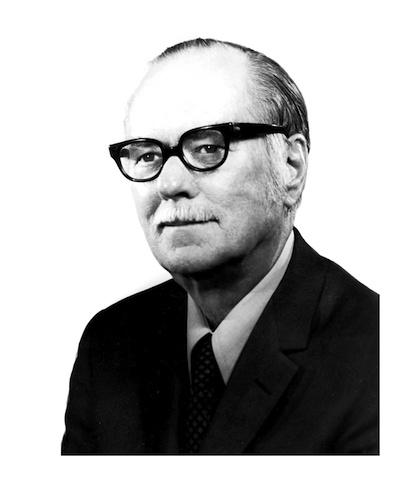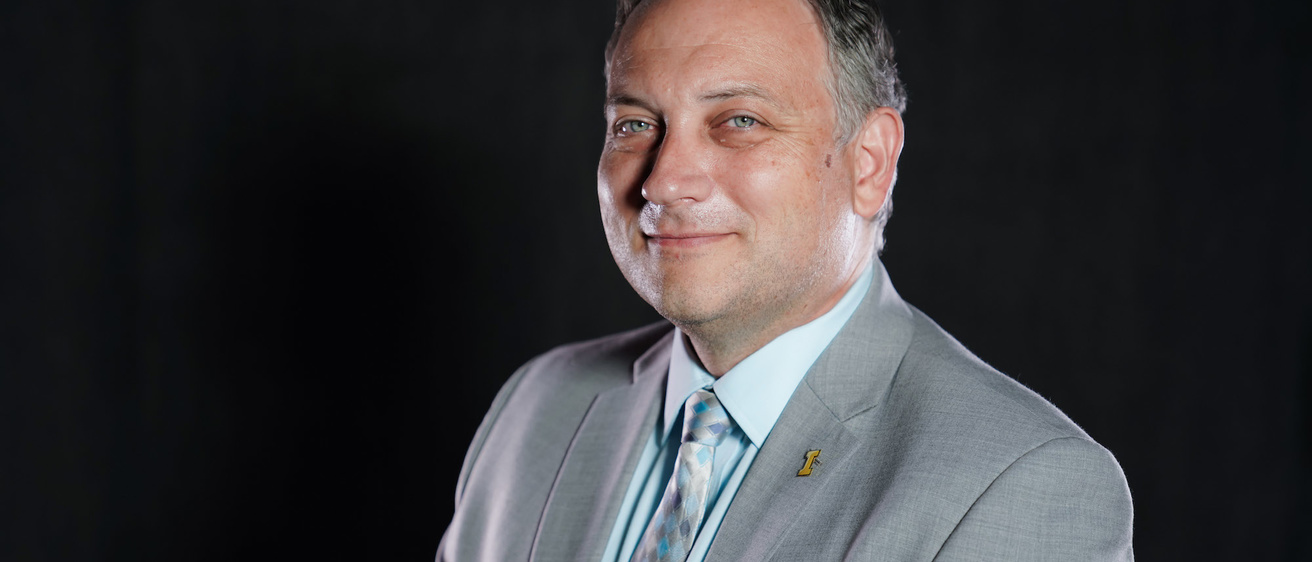By Lois J. Gray
Templin carries on Lindquist’s legacy
We live in a world of constant data collection.
Whether monitoring our heart rates and calories burned on our smart watches so we can adapt our exercise routine or being fed ads via social media based on our browser history, real-time feedback is part of our reality.
Why should testing be any different?
Jonathan Templin doesn’t think it should.
“There’s so much data infiltrating what we do in society,” says Templin, who joined the University of Iowa College of Education in January as the distinguished E.F. Lindquist Chair in Measurement and Testing and Professor of Educational Measurement and Statistics.
He adds, “Think of all the data that we collect about ourselves these days. If we can be doing that in an educational context, that would be invaluable. My real goal is to allow teachers to understand, reliably, what a student knows at every moment of the school year.”
In his new role, Templin is innovating in the field of educational assessment, building on the legacy of E.F. Lindquist.
“E.F. Lindquist was revolutionary and top-notch in every aspect with his technical prowess geared toward an outcome that really benefited education,” says Templin. “I am very honored and excited for the opportunities this creates and to carry the mission of innovation forward.”

E.F. Lindquist
Just as Lindquist revolutionized test scoring in 1955 by inventing the first optical scanner, allowing tests to be accurately scored by high-speed equipment rather than by hand, Templin is on a quest to innovate.
He is doing this by pursuing research and developing patents and products that will create more efficient processes of providing feedback to improve learning for students and teachers.
This includes innovations in the educational technology space, working with major companies to bring products to market.
Templin is a national expert in psychometrics and measurement and is the fourth individual to hold this prestigious title, named in honor of educational testing pioneer E.F. Lindquist, after whom the UI College of Education building is named.
The position was most recently held by Robert L. Brennan, professor emeritus, former director of Iowa Testing Programs, and founding director of the Center for Advanced Studies in Measurement and Assessment (CASMA).
Templin most recently worked as professor and associate chair of the Department of Educational Psychology at the University of Kansas. He has won a number of awards and has been issued several patents. Templin is the outgoing co-editor of the Journal of Educational Measurement.
Diagnostic classification models, mathematical models that make it possible to shorten the length of assessments but provide actionable information to teachers and students, are Templin’s area of expertise. These models provide multiple reliable scores from educational and psychological assessments for a more holistic way of assessing ability and knowledge. He also has expertise in using Artificial Intelligence to provide novel ways of integrating student text and voice responses into assessments.
He also studies Bayesian statistics, as applied in psychometrics, the science of measuring mental capacities and processes.
Being selected for this prestigious named chair of a testing pioneer is a huge honor, says Templin.
“It’s a great opportunity for me to pursue work that I’ve started at other places,” Templin says. “I’m really proud to be part of such a good program with active and knowledgeable colleagues.”
Rare, rigorous program results in 100 percent placement rate
In addition to teaching, research, and service responsibilities, Templin is also the program coordinator for the Educational Measurement and Statistics graduate program, which offers both master’s and doctoral degrees.
The program, which attracts students from across the nation and world, has a 100 percent placement rate, Templin says, thanks to the faculty, research rigor, and ties to the world-renowned Iowa Testing Programs as well as industry giants in the college’s backyard.
“We want to be the best type of this program that exists,” Templin says. “Our program is unique in that we are by far the largest. We have 10 tenured or tenure-track faculty who are part of our program as well as two distinguished visiting professors, and a number of emeritus, affiliated, and adjunct faculty.”
The connection to Iowa Testing Programs is a real strength for the program, he notes.
“Our program is affiliated with Iowa Testing Programs and so we have a number of people who work at Iowa Testing who have an impact on our program as well,” Templin says. “This means we have daily discussions about the important issues in our field. We are immersed in this, culturally, which is rare for such a program.”
The program also features many invited speakers and events. “Our program is unique in the educational world because there is a big tie between science and industry. E.F. Lindquist had a big role in starting the industry, and so we have huge industry connections right here in town with Pearson and ACT,” Templin says.
While many program alumni go on to positions in educational testing companies such as ACT and Pearson, both spun off from the UI College of Education thanks to Lindquist, the field of educational testing and statistics provides a launching pad for a number of careers in companies as diverse as Gallup and Google.
“There are all sorts of jobs that involve big data and that need data scientists,” Templin says. “Traditionally, we’ve been educational measurement-based but there are many more career possibilities with this degree.”
Templin has worked with students in the past, who have been offered jobs at Facebook, Google, and Apple, only to name a few.
While Templin will lead recruitment efforts for the Educational Measurement and Statistics Program, his own research will remain a high priority.
Transferring research technology to marketplace
“The bulk of my job is research, and the big charge I’ve been given is blending my research with the idea of transferring technology from the university into the marketplace,” Templin says, especially focusing on educational technology and related avenues.
While Templin will continue to publish in respected academic journals, he will also work on transferring that research to patents and products that will help others on a day-to-day basis.
The research goal Templin says he’s been working on his entire career is to get as much information as possible from tests in the shortest amount of time possible – basically, making assessments less invasive, time-consuming, and more useful to students, their families, and teachers.
“We spend far too much time testing students these days,” Templin says, “particularly when you think how much we spend on testing as a country and each state and what we receive from it at the end of the day.”
Templin says his job will be to take the research discoveries published in academic journals and get them out the door.
“These discoveries will be coupled with getting the research into nontraditional methods of licensure, tech transfer, and finding partners in the marketplace, where such methods could really impact more people,” Templin says.
In the past couple of years, Templin says he has been fortunate to find some good industry partners in educational technology including MasteryConnect, which provides a formative assessment platform. “They are tying curriculum and instruction to assessment with immediate feedback.”
Some of the research that Templin had been involved with has been licensed by MasteryConnect, which, in April, was acquired by a learning management company, Instructure, which created the ICON system used on the UI campus, among many others.
“MasteryConnect’s idea is to enable formative assessment for day-to-day learning and classroom curriculum and to use these assessments for accountability purposes,” Templin says. “If you can validly and reliably understand what a student knows across the academic year, the need for a large assessment at the end of the year is diminished.”
In fact, Templin tries to avoid the use of the words “test” and “assessment,” when possible.
He describes his research as working on a formative process to embed into daily life, where it’s learning by trial and error throughout the academic year where day-to-day decisions are really impacted by real-time feedback to help students’ performance.
Another source of pride for Templin is the theoretical research innovations he has made on the back end of psychometric testing models to shorten the number of items students need to answer to get reliable results. By cutting down the number of items to 10 from 30 to 40, students are able to take tests that still yield accurate and valuable insights.
Templin is listed as inventor on several patents for products that he has brought to market., and he is currently managing more than one million dollars in federally-funded grant activity, working with the National Science Foundation (NSF), among others.
While some people may associate tests with filling in the bubbles from multiple choice options, Templin says that increasingly sophisticated software is able to capture a variety of data in almost everything we do, whether it’s surfing Facebook or looking at the information captured on our smart watches and Fitbits.
“In the K-12 space, our goal is to make sure students are learning material and to get them to realize their potential in school,” Templin says. “There are ways to do assessment without the students even realizing it.”
This could include having students play games where their thinking and reasoning skills can be evaluated without it feeing like a formal process.
Templin says his research is attempting to change the current testing methods and transform the field of assessing ability.
“I’m a psychometrician who really doesn’t like the way we currently do assessments,” Templin says.
A psychometrician designs, scores, and analyzes tests that measure psychological characteristics, such as intelligence, aptitude, ability, personality, memory, and happiness.
Templin emphasizes he has great respect for colleagues who create assessments.
“There’s a lot of good work in the whole industry and there’s a lot of science that’s gone into it that’s not to be dismissed,” Templin says. “The problem, especially as it pertains to assessment in K-12 education, is fitting a square peg in a round hole right now. It doesn’t fit with what really is needed, and if our goal in education is to help students grow and learn, then the way that we’re doing accountability assessment now, at best, has a secondary impact.”
Templin credits his current colleagues – and those testing pioneers who came before him with bringing worldwide recognition to the testing industry.
The model of assessment as a science-driven industry was born here at Iowa,” Templin says, igniting an industry that has spread across the nation and world.
He plans to continue the tradition of innovation inspired by Lindquist and others, leveraging the legacy to forge new opportunities and to help transform the tools and techniques that will empower students and teachers with real-time feedback.
“The key to education is always to help as many students and teachers as possible,” Templin says. “We have a drive to see that our innovations touch people’s lives. We’re trying to make the world a better place through empowering and educating others. Everything we do is geared toward making the classroom environment better.”
Read more from the 2018-2019 Annual Report.
